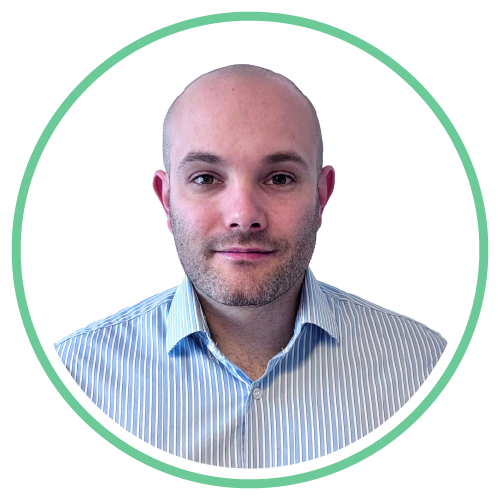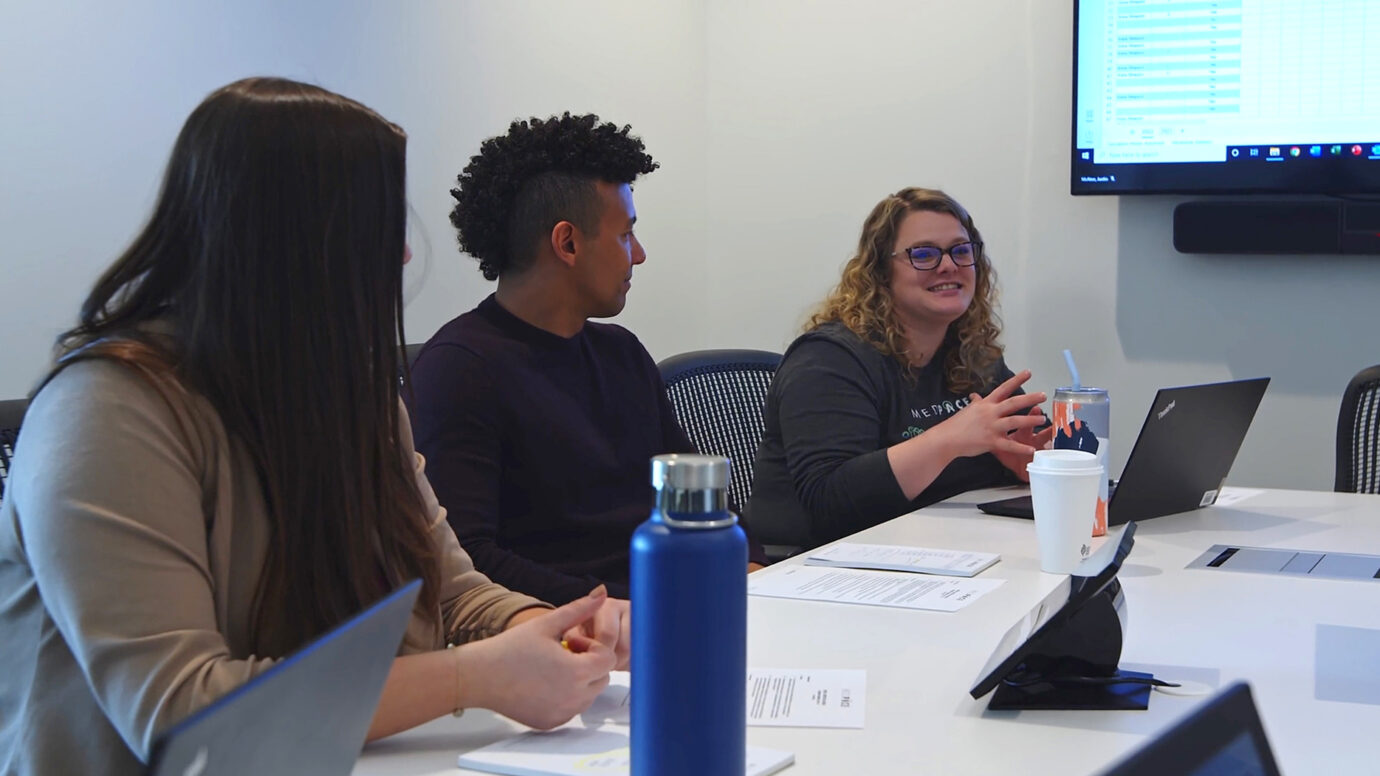The clinical research industry is ever evolving, and candidates with experience in academic research may find themselves at the cornerstone of two industries. Many PhD and Post Docs often have the knowledge to operate clinical trials but lack the awareness of opportunities available. In an effort to level the playing field, we spoke with a handful of Medpace associates who transitioned from academia into clinical research who share their experiences.
It can be difficult to make a decision about your future if you’re not aware of all of the possibilities. Check out this Q+A discussion and hear from associates across four Medpace offices.
1. Describe the transition to Medpace. How did it compare to your expectations?

Overall, I was a bit surprised at how easy the transition was. I felt well supported between the Training and Development team and the different mentors that were assigned to me. Having so many resources to help me ensured that it was a seamless transition. The hardest part of the transition was moving away some from the science and technical knowledge. My role as a Clinical Trial Manager (CTM) focuses on the operational aspects of the study and project management. There are still some opportunities to learn and understand the mechanisms of the disease indication and how the specific treatment is intended to function, but these aren’t the focus of the role. So, it took some getting used to in order to shift from the science focused mindset to the project management mindset.
2. Compare your research experience as a research assistant to clinical research.
There is definitely a big difference between my graduate research and what I do now as a CTM. During my PhD I was in an animal research lab studying neurotrauma. I spent countless hours studying animal behavior and hunched over the lab bench performing various experiments. My goal was always to get into clinical research so the transition away from the lab bench was a welcome one. However, there are a lot of tasks that I performed in graduate school that I still do in my role as a CTM. During my PhD I had to manage multiple research projects each with their own deadlines, read and understand protocols, write papers, and give numerous presentations. As a CTM I am responsible for managing multiple clinical trials that each have their own timelines, goals, and deadlines. I need to read, understand, and interpret the protocol for each of the studies. I am responsible for writing different manuals and plans that help guide the study team. I lead calls with the different sponsors that I work with and often need to present information to the investigators participating in the studies. So while there is a big difference in the overall environment and what I am conducting research on, there are similarities in many of the tasks I performed during my PhD research and what I do now as a CTM.
3. How did you discover your role at Medpace? How can candidates looking to transition into clinical research find their fit?
I am originally from Cincinnati, so I was vaguely familiar with Medpace before I started my PhD, but it was mostly in name, and I didn’t know what Medpace did. When the end of my graduate program was in sight, I began to aggressively pursue opportunities to ensure I had a job lined up. Medpace was holding a virtual information session for the aCTM program which is specifically targeted for new PhD graduates looking to transition into clinical research. The session provided great details on what the role was and what could be expected. Shortly after the information session, one of the recruiters reached out to me and I was invited for an interview. I often have people reach out to me on LinkedIn inquiring how they can get their break into Medpace or a clinical research role in general. I always recommend they keep an eye out and attend an information or recruitment event. These events are the best way to learn more about the company and the role you are interested in, and it also puts your name out there and demonstrates your interest.
4. What is one skill you brought with you to your role that, without your PhD, might not have been as initially developed?
There are many great skills that my PhD prepared me with that have helped me succeed at Medpace. I think one of the most beneficial is simply the ability to learn. Earning a PhD teaches you how to be an expert at teaching yourself and being able to digest, understand, and learn new topics. Most everything I was doing and learning as a new employee at Medpace was new to me. Not only was I learning how to function in my role, I also had to learn the different protocols for my studies and understand the history and goal of the clinical trials. I feel that my PhD education really prepared me to jump right into the role and be ready to learn and understand all the new topics that were being thrown at me.
1. Describe the transition to Medpace. How did it compare to your expectations?

I get asked this question a lot by people who are currently in academia but looking to transition to industry and I always have the same answer – it exceeded my expectations in all of the best ways. I spent the 5 years of my PhD working in a research lab where I did everything on multiple research projects. I wrote up the study proposal and protocol, applied (and reapplied) for IRB approval, recruited participants and worked to retain them on the study. Then I performed all the study procedures with the recruited participants, cleaned and managed their data, and ran high-level statistical analyses to determine whether my hypotheses were correct. If they were, then I wrote the entire manuscript for the study, submitted (and resubmitted) it for publication, and shared it with the rest of that scientific community if it was published. On top of this all, I was in charge of managing and overseeing the entire process and ensuring everything was done correctly, responsibly, and ethically.
When I got to Medpace, I realized that every single one of those tasks on all of those research studies are actually assigned to separate departments for all studies. Medical Writing writes up protocols and manuscripts for publication, Business Development works on proposals and getting new studies up and running. Regulatory Submissions handles all things IRB and ethics, Data Management exists to ensure data accuracy and consistency, and Biostatistics run the complicated analyses required to determine if an investigational product did what it was predicted to do. There is a Patient Recruitment and Retention team who work to find participants for the study sites and run all of the study procedures. All of a sudden, I went from being everything to only having one job – project management – which was the aspect of my academic research that I had always enjoyed the most.
Medpace is also great in terms of onboarding new employees and ensuring their success throughout their transition. The training modules are clear and concise, so I knew exactly which responsibilities fell to me and which ones fell to other functional areas. I started the job with mentors already assigned to help me with the training and transition project, and soon realized the environment at Medpace is extremely collaborative, which made me comfortable going to tons of new people for questions or assistance. There are clear timelines for growth in your position and set goals for you to achieve every year in order to help with that growth. The organization and commitment to training employees at Medpace was a dream to experience after being in an environment without those things for so long.
2. While you have a set of highly specific, specialized skills, what are some non-science skills you’ve honed or developed at Medpace? How does Medpace provide opportunities for associates to grow their skillsets?
I believe I’ve honed and developed a lot of skills since starting at Medpace! While all research has the same foundations, there are a lot of big differences between academic and industry research. Industry research requires stronger collaboration and communication skills because you are working with so many different people across various types of companies, whereas academic research tends to be quite siloed. The environment in industry is collaborative, whereas academic research feels more competitive. Because of this, my collaboration communication skills have increased ten-fold since joining Medpace. I also think I’ve honed my problem-solving skills a lot because I face a wider variety of problems that could arise and have to find more unique solutions for a lot of them. From all of this, I have become a much better project manager than when I first left academia.
3. There exists great opportunity in both academia and industry roles. In your experience, how does Medpace enable you to balance your passions with moving science forward?
Medpace is the perfect combination of the research aspect I loved about academia but with the benefits of working in industry. I love the feeling of knowing the research that I’m a small part of could have the potential to change people’s lives but also the fact that I have a life outside of research as well. With a better work-life balance, I’ve been able to find new passions – I even ran the London Marathon last year, something I never could have done during my PhD! Another passion of mine is helping others, and I think being at Medpace allows me to do that through my work. After working in both industry and academia, it is easier for me to see how the research I am working on betters the population compared to how I felt with my academic research. I love that aspect of my job, and while I enjoy various aspects of both sides, I am very grateful that I transitioned into an industry position after my PhD.
1. Describe the transition to Medpace from academia. How did it compare to your expectations?

My transition to Medpace from academia was easier than I expected on many points. I worked in a French university as a Bacteriology teacher for 5 years before entering Medpace, and I thought that this change would be hard as this is two very different ways of working. But from my experience, since my first day at Medpace, I have been accompanied by a great team – from my manager to the Training and Development team. This led me to adapt to my work quickly to achieve my new goals and to better fit in Medpace expectations.
The point that I would like to highlight is that the PACE® (Professional Achieving CRA Excellence) training program not only thought me how to work as a CRA, but also provided resources to help me better understand business-oriented tasks and to act accordingly.
2. There exists great opportunity in both academia and industry roles. In your experience, how does Medpace enable you to balance your passions with moving science forward?
There is definitely great opportunity in both academia and industry positions. Working at Medpace can really be exciting in that you stay at the top of technical advances in health. Before Medpace, I’ve worked in several fields such as fundamental biology and oncology, and this was exciting but abstract. Here at Medpace, I am involved in clinical trials that are exciting and very practical/applied where I can continue to stay up to date with advances and new developments in a new way.
3. With advanced degrees in biology, was clinical research a career path consideration early on?
I’ve always known that I would like to work in a health-related role, but clinical research was definitely not a career path that I considered during or after my PhD. I honestly think that if I had known earlier what clinical research really is and the role of the CRA in clinical trials, I would have taken this turn in my career much earlier.
4. How did you discover your role at Medpace? How can candidates looking to transition into clinical research find their fit?
I discovered the position of CRA in a job fair in my city (Lyon) and then I met someone who works at Medpace who explained to me what the job is and the big picture of the daily tasks of a CRA.
1. With a master’s in medical biotechnology, was clinical research a career path consideration early on?

Initially, my focus during my master’s in medical biotechnology was on preclinical research—learning key experimental techniques, developing an aptitude for asking the right scientific questions, and working across different disease models, particularly in cancer. However, my internship at Biocon, a major Indian biopharmaceutical company in Bengaluru, gave me my first real exposure to drug development. Spending nine months there, I gained insight into novel biologic and biosimilar development, downstream validation, and how R&D teams work to push beyond existing therapy benchmarks in terms of safety and efficacy. While this provided a window into clinical research, my primary interest at the time was still in honing my research skills in an academic preclinical setting, which led me to pursue a PhD in cell biology with a focus in oncology followed by seven years of postdoctoral research in cancer immunology in the US. As I gained a deeper understanding of working with clinical datasets, learning to read and analyze published clinical trial results, it led me to transition into clinical trial management, where I could leverage my scientific expertise while engaging in the operational and strategic aspects of late-stage drug development.
2. With a range of experience in fields like freelancing and review editing, describe the transition into a clinical trial manager role.
My transition from preclinical research to clinical trial management was gradual and shaped by multiple experiences. During my PhD, I worked extensively with in vitro and in vivo cancer models, helped characterize and commercialize a mammary cell line model to aid cancer research, and had indirect exposure to clinical trials through my PhD mentor, an MD who was involved in oncology trials. His clinical research staff gave me informal insights into patient recruitment and trial operations, which led me to complete GCP training. However, I was still deeply engaged in preclinical research and pursued postdoctoral work at Cincinnati Children’s, where I multitasked as a review editor in international hematology oncology journals and conducted my research integrating dry lab clinical dataset analytics with wet lab cancer immunotherapy resistance studies. It was during this time that I interacted with translational research experts and Medpace associates who visited our institution, giving me a clearer understanding of the business and operational side of clinical trials. These interactions, combined with my evolving interests, solidified my decision to move beyond the bench to dynamic environments that impact patient-centered drug development directly, leading me to transition from preclinical research to managing clinical trial operations.
3. While you are able to use your highly technical skills at Medpace, what are some non-science skills you’ve honed or developed? How does Medpace provide opportunities for associates to grow their skillsets?
Beyond my technical expertise, my transition into clinical trial management at Medpace has helped me develop 4 critical non-science skills that academia often doesn’t emphasize.
Structured documentation, including meeting minutes, study plans, decision logs, and accountability records, are key skills I’ve developed. Unlike academia, where informal discussions often guide projects, industry relies on structured communication to align teams and clarify next steps, especially with FDA audits in mind.
- The biggest shift I’ve experienced at Medpace is valuing collaboration over solo expertise. Success comes from working with cross-functional teams in areas like regulatory affairs, medical monitoring, data management, and biostatistics. Unlike academia, where the focus is often on individual contribution and independent problem-solving, Medpace fosters a culture where integrated expertise from multiple teams drives success.
- Decision-making under time constraints is another skill I’ve honed. In academia, you have the luxury of taking weeks to consider a problem, whereas industry—particularly in a major CRO like Medpace—requires rapid decisions backed by cross-functional input, balancing scientific rigor with real-world feasibility.
- Strategic communication and relationship-building have become essential. Whether engaging with clients, trial sites, or stakeholders on budgets, timelines, or expectations, effective messaging means being concise, respectful of others’ time, and maintaining a professional yet personable tone. Unlike academia’s detailed, technical communication, industry demands brevity and clarity.
These are skills I continue to hone and Medpace provides a structured environment to develop them through training programs, mentorship, and hands-on exposure to trial operations.
4. Some PhDs or Postdocs may not be aware that clinical research is an avenue they can pursue. What is one piece of advice you would share with someone considering their post-graduation options?
Many PhDs and Postdocs remain unaware that their analytical thinking, problem-solving skills, and scientific expertise are highly valuable in clinical research. My advice is to proactively explore career paths beyond academia before your PhD defense or during the first year of your Postdoc—network with professionals in clinical research, engage in informational interviews with the clinical research coordinators at your academic institutions, take online courses in regulatory affairs or clinical trial management to get an understanding of the discipline, and seek internships or shadowing opportunities along with taking GCP training. Transitioning from the bench to clinical research does require adaptability, but for those who enjoy working at the interface of science, medicine and business while contributing to real-world patient outcomes, it is an incredibly rewarding path. Having made this transition myself, I’ve found that my preclinical background gives me a unique perspective in trial design and execution, and I would encourage others to consider this as a viable and impactful career option.
1. Why did you pursue a role outside of academia?

At one point in my career, I realized that I was very interested in statistics application in healthcare, so I moved to Italy to pursue my second PhD in statistics. I did apply for biostatistician roles within the pharmaceutical industry after graduating with my PhD in 2014, but I was rejected every time due to not having experience in clinical trials. I decided to stay in academia until 2022 when I applied for a role at Medpace.
2. How does research as a PhD compare to clinical research? How does Medpace enable you to balance your interests and skills with moving science forward?
From my personal experience, these two things are very different and hard to compare. During my PhD in statistics, my research focus was to investigate a specific topic using real world evidence datasets and I worked on my own. In clinical research, I am a part of a big team working together. Before starting at Medpace, my understanding about the Biostatistician role in clinical research was very limited. I was a bit anxious that the job would be very monotonic from one study to another. However, I was very wrong about this. At Medpace I have the opportunity to work on different studies in different therapeutic areas which means each study requires a different statistical approach.
3. Some PhDs or Post Docs may not be aware that clinical research is an avenue they can pursue. What is one piece of advice you would share with someone considering their post-graduation options?
Explore and do research. Use LinkedIn to connect with people and reach out to people that hold positions you may be interested in. Go to career events as those are not just for bachelor’s and master’s students.
Find your fit.
Ready to start turning your passion into progress? Find your fit at Medpace and browse the range of opportunities.

Medpace careers